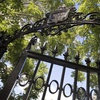{shortcode-4c88b6afb940aa702973694f9b2a2943eb858dc1}
Last week, the Trump administration announced that it would review more than $8 billion in funding to Harvard on the grounds that the University had allowed antisemitism on campus.
The centerpiece of Republican outrage about antisemitism at Harvard’s campus can be represented by a lawsuit filed by Alexander “Shabbos” Kestenbaum — a speaker at last year’s Republican National Convention — and two other plaintiffs. The lawsuit alleges a double standard between how Harvard treats Jewish students and other minority groups.
The pro-Israel right hopes to see a Harvard where the culture of administrative overreach extends to Jewish students, too. Though the discrepancy in administrative treatment between Jewish and other minority issues certainly merits scrutiny, the right approach would have Harvard reject the illiberal speech norms that have permeated the right as well as the left. As Harvard’s response to funding threats comes into view, it would do well to coddle nobody instead of everybody.
The lawsuit repeatedly contrasts the strictness with which Harvard approaches speech perceived to threaten minority groups against the laxity employed toward speech some Jewish students found upsetting — including questioning the existence of the state of Israel.
When Human Evolutionary Biology lecturer Carole K. Hooven was attacked for stating the existence of two sexes, she claimed Harvard provided very little public support, prompting her to leave her position. By contrast, the University took decisive actions to make statements during the Black Lives Matter movement and the ongoing crisis in Ukraine.
Meanwhile, in the lawsuit, the Jewish students claim that although “Harvard permits students and faculty to advocate, without consequence, the murder of Jews and the destruction of Israel,” Harvard requires students to “take a training class that warns that they will be disciplined if they engage in sizeism, fatphobia, racism, transphobia, or other disfavored behavior.”
This inconsistency represents a real double standard. It is generally illegal to treat various minority groups differently. Hence, the lawsuit.
But in the wake of the October 7th attacks and Israel’s subsequent occupation of Gaza, pro-Israel activists have sought to push Harvard’s administration to flex the same institutional muscle in favor of their cause as other issues, solving the double-standard problem with more censorship and more administrative interference, including instituting more stringent time, place, and manner restrictions and reviewing academic programs.
The problem, according to this view, was not (as right-wingers have been saying for years) that the administration was too censorious or insufficiently friendly to free speech on campus, but rather that the administration was incorrectly censorious — it shut down the wrong speech. Thus, the right-wing critics were not launching a principled defense of speech, but instead acting as a funhouse mirror image of illiberal-left speech norms.
In responding to complaints of antisemitism, Harvard risks the same error. Indeed, Harvard has already dismissed the leaders of the Center for Middle Eastern Studies, placed the Palestinian Solidarity Committee on probation, suspended ties with Birzeit University — a school in the West Bank, and adopted a definition of antisemitism that restricts certain criticisms of Israel.
Harvard must strike the right balance. Antisemitism is a serious problem and Harvard should get serious about it. The University must help foster an environment where Jewish students feel safe and respected. However, addressing antisemitism cannot simply mean enforcing blanket protections or silencing conversations that some students find distressing.
The solution isn’t to start treating Jewish students with the same suffocating protections extended to other groups, but to enforce a single standard that, yes, takes hate seriously but seeks to foster free and open inquiry — even when it gets upsetting.
Harvard should commit to applying a single, consistent standard across the board — one that holds everyone accountable for hateful behavior, but also recognizes that free inquiry and speech must be protected.
As the Oval Office continues to shake Harvard down, the University should stand firm in its commitment to academic freedom while addressing antisemitism with the seriousness it deserves. This extraordinary political moment requires the courage to defend free speech, even when it’s uncomfortable, and the courage to create a campus where all students, regardless of their background, can engage in robust and respectful discourse.
Benjamin Isaac ’27, a Crimson Editorial comper, is a Government and Economics concentrator in Eliot House.
Read more in Opinion
Where Did All the Radicals Go?












